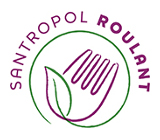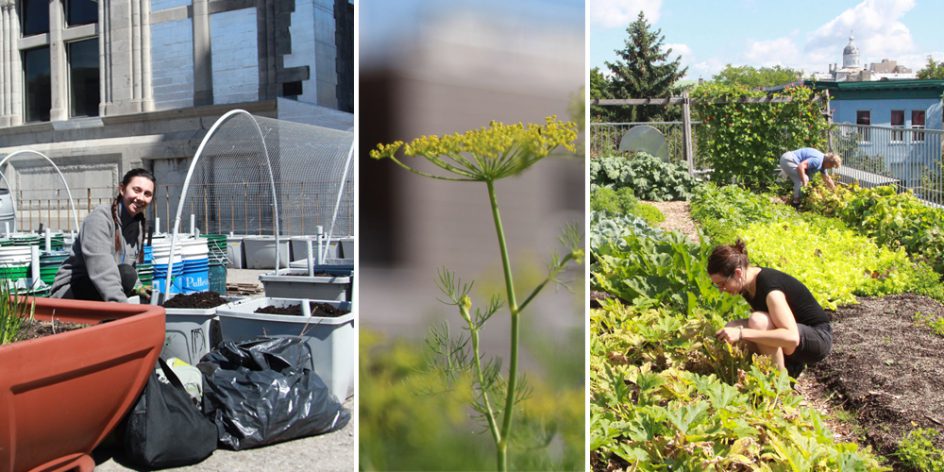This year brings some exciting changes in our Urban Agriculture (UA) program. Carlo, our UA Manager, invites you to journey through the history of UA at the Roulant and see what the future brings!
Growing our own food
For the last 15 years, UA has played a key part in our programming at the Roulant. In our quest to provide more fresh, local and organic vegetables in our Meals-on-Wheels program, we decided to begin growing our own food in 2004.
The adventure started with self-watering bins built in partnership with Alternatives (2004-2006), and expanded to the Edible Campus gardens at McGill in 2007. With the food grown at McGill, we began offering organic community supported agriculture (CSA) baskets, as well as supplying veggies for our Meals-on-Wheels recipes. Upon moving to our current location at 111 rue Roy east in 2010, we raised the funds to build a rooftop garden and terrace directly above our own kitchen!
Throughout this time, the incarnation and rasion d’être of the program has shifted from site to site, from exploring production techniques, to ensuring a high production, to focusing on access and education.
We have learned a lot since we first started gardening. Our biggest lesson came about after our expansion into farming in 2012, with the establishment of our 3.5 acre peri-urban farm in Senneville. The farm now produces enough produce to supply 100 organic baskets, a weekly Farmers’ market, and the meals-on-wheels program.
With the Roulant’s need for veggies being met by the farm (and then some), UA faced a bit of an existential crisis: what role does urban gardening play in the face of a bounty of produce from the farm? This question really pushed the UA co-managers to realize that the goal of UA was not self-sufficiency or high production, but that there was instead an important interdependence between urban and rural agriculture. We began to recognize that our urban gardens should instead be a way for you, our community, to access gardening opportunities and education, allowing you to connect with your food system and, hopefully, take that knowledge back to your own gardens.
The 2016 season became an opportunity for reflection for the four members of the UA team. Through the hands-on experience gained from two interns and an apprentice, and with the help of our friends at Innoweave, we reaffirmed our belief that the role of UA in the context of a broader agriculture program should be to deepen the collective knowledge of our community to grow food, and to empower you to do so.
Going forward
With this reflection in mind, there are some big, exciting changes in store for the 2017 season! The details may shift in the coming months as different projects evolve, but this is how things look so far:
McGill
This year, the Roulant will begin a transition out of the Edible Campus at McGill. We are really thankful for what this space has provided us over the years. It has been a wonderful opportunity to get our hands dirty and do meaningful food production. It allowed us to begin offering CSA baskets, and gave us a beautiful, accessible venue for intergenerational events with clients. Our relationship with the McGill University has been key in the growth of our Agriculture Program and we have made some invaluable friendships through these relationships.
However, we now feel that it’s time to close this chapter and pass on this vibrant space and knowledge to other groups. In 2016, we started the transition by introducing a community plot model, providing technical and logistical support to community groups wanting to garden on the campus. This year we will maintain a presence on campus but will reduce our activities, giving the University time to implement their own plan for the coming years, and ensuring the continuity of the project beyond our time there.
Roy Street
In an exciting development this year, the Plateau Mont-Royal announced that it will temporarily block car traffic on Roy street outside the Roulant, converting it into a pedestrian walkway from June to September. As part of the planning process, we have been invited to meet with urban planners and we hope to dedicate space to UA directly on the street. This means that, although we will be phasing out our presence at the Edible Campus, we will gain new, very accessible gardening space much closer to home! It will help us to illustrate the deep connections between our different programs, and help us further our education goals.
Rooftop garden and terrace
Throughout this transition, we will continue to have a beautiful area that we can cultivate, right above our heads. The rooftop garden and terrace will still play a key part in demonstrating a closed-loop system within our building. We hope to have some news to share with you in the coming months about increasing the accessibility of these spaces…. Stay tuned!
UA Team
Coinciding with this shift in our program, Carlo, our UA Manager since 2014, will be leaving the Roulant in early May. So, when planning out the new role for the next UA Manager, we focused on finding someone who will use our agricultural spaces to inspire through education. This person will strive to use production as a means to an end, rather than as a goal itself.
Impact
With shifts of this magnitude, you, our community members, will see some changes in the coming months. Volunteering opportunities at McGill will be somewhat reduced, but the street closure will provide you with new ways to join in during much of the growing season. Additionally, volunteering at the farm has doubled in the last year, and we hope to offer even more occasions going forward. We will then focus our efforts on contributing more deeply to urban agriculture education in the community sector.
With less space dedicated to growing, we will be producing less food downtown. Yet our aim is to really focus on connecting the realities of urban and peri-urban spaces. To our knowledge no other organization in Canada has the opportunity to understand so deeply the realities of producing food both in a city and on a peri-urban farm!
In the coming years we hope to use our experience and our gardens to strengthen our community’s collective knowledge and skill level, so as to become even more of a catalyst for ensuring Montrealers are well fed and engaged in their food system.
Have some thoughts to share? Carlo is still around for a little while and is more than happy to talk through these changes, to hear your feedback on what has worked well for you in UA and what you would like to see, or to just talk shop. Send him an email anytime.

